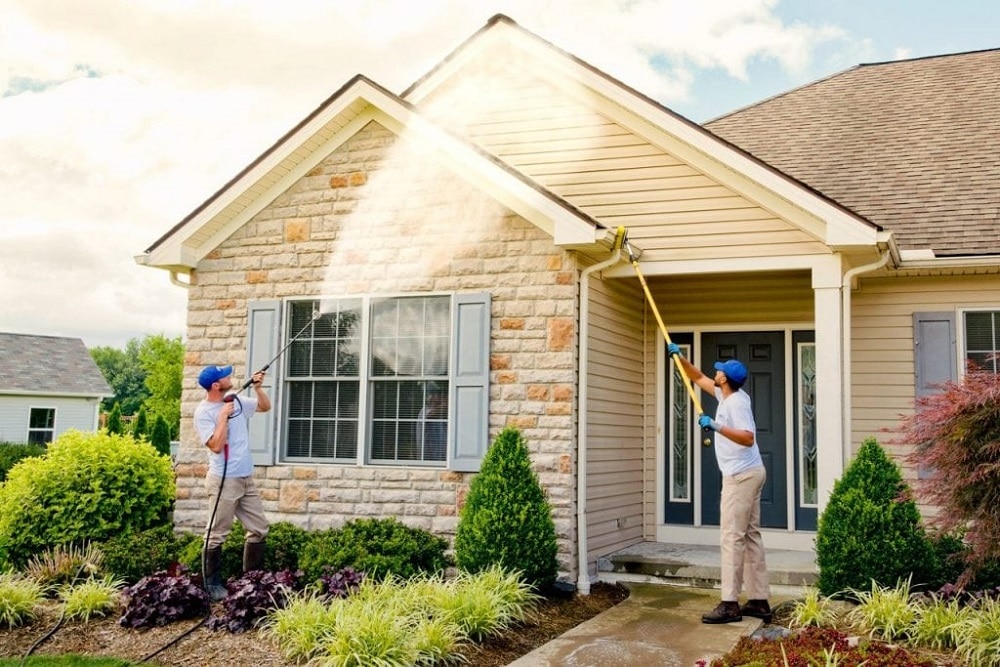Living in Closter, New Jersey, surrounded by charming streets and beautiful homes, keeping your curb appeal in top shape is a priority. But let’s face it, exterior cleaning can be a daunting task. Grime, dirt, and weather can take a toll on your driveway, patio, deck, and siding. Fear not, fellow Closter resident! The answer lies in the mighty power washer – a tool that can transform your outdoor space in a flash.
However, before you crank up the engine and unleash a torrent of water, let’s ensure you’re wielding this powerful tool safely and effectively. This comprehensive guide is packed with pro tips to help you conquer those cleaning projects and transform your Closter home’s exterior into a sparkling oasis.
Safety First: Protecting Yourself and Your Property
Safety should always be your top priority when wielding a power washer. Imagine it as a superhero – powerful and effective, but needing the right training to avoid causing chaos. Here’s how to suit up for success:
- Gear Up Like a Pro: Safety goggles, gloves, sturdy shoes, and long pants are your essential power washing attire. Consider a respirator for certain tasks that might generate dust or fumes.
- Inspect Your Power Washer and Trusted Sidekick (the Hose): Before diving in, check your power washer for leaks, cracks, or loose connections. Don’t forget to inspect your hose – make sure it’s rated for the pressure of your power washer to avoid any surprise bursts. If you’re in need of a replacement, choosing the right hose for a power washer ensures safe and efficient cleaning.
- Secure the Cleaning Area: Envision yourself as a meticulous painter – cordon off the zone! Move cars out of the way, cover electrical outlets with waterproof material, and shut off sprinkler systems to avoid accidental soaking.
- Master the Trigger: Maintain a safe distance from the surface you’re cleaning. It’s like a superhero learning the limits of their powers. Avoid spraying electrical components or windows directly. A little caution goes a long way in preventing damage.
Choosing the Right Power Washer: Your Weapon of Choice
Not all power washers are created equal. Choosing the right one for your Closter home is like selecting the perfect tool for the job. Here’s a breakdown of the key features to consider:
- Gas vs. Electric Power Washers: Weighing the Pros and Cons
- Gas-powered: These are the powerhouses of the pressure washing world. Ideal for bigger jobs and providing more cleaning muscle, they’re often portable (especially with a trailer), but require more maintenance.
- Electric-powered: Quieter, easier to use, and with less maintenance needed, electric power washers are great for smaller jobs. However, they’re limited by the length of the cord, so ensure your hose reaches all the cleaning zones!
- Understanding PSI (pounds per square inch) and GPM (gallons per minute):
- PSI: This indicates the cleaning power of your pressure washer. Think of it as the force behind the spray. In general, a range of 1500-2000 PSI is suitable for most residential cleaning tasks in Closter.
- GPM: This determines the water flow rate – how much water the washer blasts out per minute. Higher GPM means faster cleaning, but you might use more water. Consider the size of the cleaning project and find a balance that works for you.
- Extra Features: Power Up Your Cleaning Arsenal
- Nozzles: Different nozzles create varying spray patterns. A wide spray nozzle is great for cleaning driveways, while a narrow one is ideal for more focused cleaning tasks.
- Detergents: Choosing the right cleaning solution can significantly boost your power washing efforts. Specific detergents are formulated for tackling different types of grime, like oil stains on patios or mold on siding.
- Extension Wands: Do you have those hard-to-reach areas that make you feel like scaling a skyscraper with a bucket and sponge? Extension wands can help you conquer those cleaning challenges from the ground.
Prepping Your Closter Property for Power Washing: Setting the Stage for Success
A little prep work goes a long way in ensuring a smooth and successful power washing experience. Think of it like prepping a canvas before you paint your masterpiece:
- Clear the Cleaning Area: Move or cover furniture, decorations, and precious plants to shield them from the spray and debris. Imagine them as innocent bystanders you don’t want to accidentally soak.
- Protect Vulnerable Areas: Use drop cloths or tarps to safeguard windows, doors, landscaping elements, and anything else you don’t want to get a power washing bath.
- Test It Out: Find an inconspicuous spot on the surface you’ll be cleaning, like a corner of your driveway or a hidden section of your siding. This test run allows you to check the cleaning power and spray pattern of your power washer. It’s like a practice round before the big game!
- Dampen the Surface (Optional): For some materials, like concrete, dampening the surface before power washing can improve cleaning efficiency. Think of it like softening the dirt before scrubbing – it makes the job a little easier.
Conquering Cleaning Projects in Closter with Your Power Washer: Unleash the Cleaning Power!
Now that you’re geared up with the right knowledge and safety measures, it’s time to unleash the cleaning power of your pressure washer! Here are some tips for tackling common outdoor cleaning challenges in your Closter home:
- Driveways and Sidewalks: These high-traffic zones battle constant grime. Use a wide spray nozzle and adjust the pressure based on how dirty they are. For heavily ingrained dirt, start with a higher pressure and gradually decrease it as the grime loosens. Remember, a gentler touch is better for delicate surfaces like stamped concrete.
- Patios and Decks: These outdoor living spaces deserve some TLC. Opt for a lower pressure setting and a nozzle suitable for wood surfaces. Stubborn stains might require a deck cleaner specifically formulated to tackle them without damaging the wood. Be sure to follow the manufacturer’s instructions for using any cleaning solutions.
- Siding and Exterior Walls: The facade of your Closter home deserves a sparkling clean. Match the cleaning method to your siding material. For example, vinyl siding is generally more delicate and needs a lower pressure setting compared to brick or stone. Always consult your siding manufacturer’s recommendations for the safest and most effective cleaning approach.
- Fences and Pergolas: These vertical structures often accumulate dirt, dust, and cobwebs. Start cleaning from the bottom and work your way up to avoid streaking. This way, the dirty runoff drips down onto the already cleaned area, preventing those unsightly streaks.
- Pool Decks: For oil stains that can mar the beauty of your pool deck, use a degreaser according to the instructions. For mold and mildew, a diluted bleach solution can be effective. However, use extreme caution! Wear proper PPE (personal protective equipment) like gloves, goggles, and a respirator, and never let bleach come into contact with plants. Consider enlisting a professional for this task if you’re unsure about handling bleach safely.
Advanced Power Washing Techniques (for the Ambitious DIYer): Tread Carefully!

Feeling confident and ready to tackle tougher cleaning jobs? These techniques can be powerful allies, but proceed with caution:
- Degreasing Driveways and Patios: For heavily oil-stained concrete surfaces, a degreaser can work wonders. Apply the degreaser according to the manufacturer’s instructions and follow up with power washing. Remember, a little degreaser goes a long way – avoid overusing it, as it can strip away the natural oils in concrete.
- Bleach for Mold and Mildew (Use with Extreme Caution!): Mold and mildew can be stubborn eyesores on your siding or deck. A diluted bleach solution can be effective, but extreme caution is necessary. Only use diluted bleach solutions in well-ventilated areas. Wear proper PPE, including gloves, goggles, and a respirator, to avoid inhaling bleach fumes. Never let bleach come into contact with plants, as it can damage them. If you’re uncomfortable handling bleach, consider using a commercial mold and mildew remover specifically designed for power washing.
Safety Note: Sandblasting is a powerful and potentially dangerous method for extremely tough cleaning jobs, like removing lead paint. It’s not recommended for DIY projects due to the safety hazards involved. If you have a job that requires sandblasting, rent the equipment from a qualified supplier and strictly follow all safety protocols. Consider hiring a professional experienced in sandblasting to ensure the job is done safely and effectively.
Maintaining Your Power Washer: Keeping Your Cleaning Companion in Top Shape
Just like any trusty tool, your power washer needs proper care to keep it running smoothly and ensure it’s there for you when you need it. Here’s how to maintain your power washer:
- Post-Cleaning Maintenance: Once you’ve finished your power washing project, it’s time to give your washer some TLC. Drain the water from the pump and hoses according to your owner’s manual. This is especially important for winter storage to prevent freezing damage.
- Clean the Nozzles and Attachments: Remove any debris lodged in the nozzles using a soft wire or compressed air. This ensures proper spray patterns for future cleaning endeavors. If the nozzles are damaged beyond repair, replace them for optimal performance.
- Storing Your Power Washer Properly: Finding a clean, dry, and protected location for your power washer is key. Here are some additional tips depending on your washer type:
- Gas-powered models: To prevent issues during the next use, run the engine until it consumes all remaining fuel in the carburetor. This helps prevent clogs and ensures smooth starting next time.
- Trailer maintenance: If you have a trailer-mounted power washer, don’t forget to check the tire pressure, lights, and overall condition of the trailer before storing it for long periods. A well-maintained trailer ensures safe and convenient transportation of your power washer whenever you need it. Proper attention to your pressure washer trailer setup can prevent issues and ensure readiness for your next cleaning task.
- Troubleshooting Common Power Washer Problems: Even the best tools can encounter minor hiccups. Here’s how to tackle some common power washer problems:
- Low Water Pressure: This could be caused by a clogged hose or filter. Inspect the hose for kinks or debris and clean the filter according to your owner’s manual. Ensure a proper connection to the water source as well.
- Clogged Nozzles: As mentioned earlier, a soft wire or compressed air can help clear debris lodged in the nozzle. If the nozzle is beyond repair, replace it for optimal cleaning performance.
- Engine Starting Issues (gas-powered models): Check the spark plugs, fuel level, and air filter for potential culprits. A dirty spark plug, low fuel, or clogged air filter can prevent the engine from starting. Refer to your owner’s manual for troubleshooting steps specific to your model. If you’re not comfortable tinkering with the engine, consider taking it to a qualified service center for repairs.
Beyond Power Washing: Additional Cleaning Options for Your Closter Home
While power washing is a powerful tool, it’s not a one-size-fits-all solution. Here are some alternative cleaning options to consider for your Closter home:
- When to Hire a Professional:
- Large or complex cleaning jobs: Extensive roof cleaning, multi-story buildings, or delicate surfaces like slate or cedar shingles might be better left to the professionals. They have the expertise, equipment, and safety measures to handle these challenging tasks effectively.
- Two-story homes or hard-to-reach areas: Safety always comes first. If you’re unsure about reaching high areas on a two-story home or feel uncomfortable cleaning certain areas, consider hiring a professional with the appropriate equipment and safety gear.
- Lack of confidence or experience: There’s no shame in admitting that power washing isn’t your forte. If you’re unsure about the cleaning process, proper techniques, or safety protocols, professional home cleaning services can ensure a safe and effective job.
- Eco-Friendly Cleaning Solutions: For the environmentally conscious Closter resident, there are eco-friendly alternatives to harsh chemicals:
- Vinegar or Baking Soda: These natural cleaning powerhouses can be effective for mild cleaning tasks on patios, furniture, or siding. Always test a solution in an inconspicuous area first to ensure it doesn’t cause any discoloration.
- Biodegradable Cleaning Products: Look for eco-friendly detergents specifically designed for power washing. These detergents are just as effective as traditional cleaners but minimize environmental impact.
Power Up Your Closter Home with Confidence!
With these comprehensive tips and a newfound understanding of power washing, you’re well on your way to transforming the exterior of your Closter home. Remember, safety is paramount. Don’t hesitate to call in a professional for complex cleaning jobs or if you’re unsure about the best approach. With the right knowledge and your trusty power washer by your side, you can keep your Closter home looking its sparkling best year-round!
Bonus Tip: Feeling neighborly? Offer to lend a helping hand (and your power washing expertise) to spruce up your friend’s Closter home exterior too! Sharing the cleaning power can strengthen those neighborly bonds.




